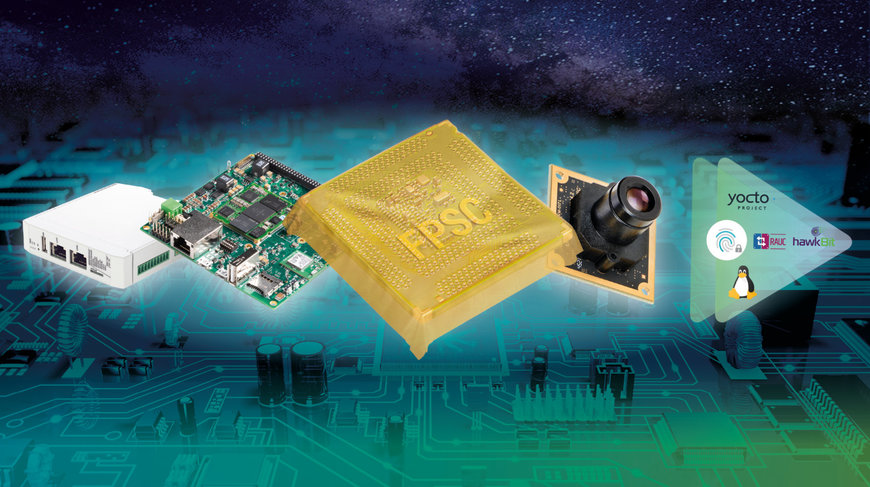www.ptreview.co.uk
26
'24
Written on
Modified on
Phytec News
Phytec at the embedded world: New embedded standard FPSC and SOMs with NXP i.MX 95 and i.MX 8M Plus
Phytec unveils the new solder module standard FPSC - Future Proof Solder Core at the embedded world, alongside with the two System on Modules, phyCORE-i.MX 95 and phyCORE-i.MX 8M Plus, which adhere to this standard.
www.phytec.com

FPSC is built upon defined feature sets and pinouts, ensuring maximum compatibility for similar processors while minimizing overhead on components. Additionally, Phytec demonstrates how businesses can benefit from comprehensive services spanning from development to software and security, resulting in CRA-compliant device management. As part of the embedded world Conference, Phytec engineer Jonas Remmert will host a hands-on workshop on the Zephyr Project on April 9th.
FPSC: SOM Standard for Simplified Product Variants and Upgrades
The patented FPSC standard for System on Modules has been specifically developed for extremely compact, powerful, and cost-effective embedded designs. For this reason Phytec has defined feature sets for processors with similar characteristics. All features of the processors are available within the footprint, which is organized into three zones: Must-Have Signals, Preferred Signals, and Proprietary Signals. The innermost Must-Have zone encompasses all common interfaces for embedded standard products. These interfaces will also be served by future FPSC modules with matching pinouts. This ensures high security of investment and enables easy processor upgrades throughout the product-lifecycle.
For the initial defined feature set, FPSC 24A.0, and the processors i.MX 95 and i.MX 8M Plus, the Must-Have Signals zone covers 52 percent of the processor features. This is significantly higher than that of other solder module standards, which guarantee less than 30 percent identical features. The first FPSC modules, phyCORE i.MX 95 and phyCORE i.MX 8M Plus, are only 41 mm x 44 mm in size. Customers who do not require standardization experience no disadvantages with the FPSC modules. In addition, they benefit from the state-of-the-art footprint and solder connectors at the corners, enabling extremely high robustness and easy processing.
Software and Development Support for Faster Time-to-Market
Assisting customers in achieving fast to market success and complementing their expertise with development support, software, and services is another focal point of the Mainz-based company. From design review to security consultation and integration, as well as software lifecycle management, Phytec provides a comprehensive range of services. The software team showcases exciting demos of GUI frameworks for user interface development, along with an Arm SystemReady Single Board Computer booting Red Hat Enterprise Linux out-of-the-box for the first time.
OEM Products, Industry Solutions, and Embedded Imaging
Phytec offers electronics for quick integration or direct use by OEM partners, combining hardware for typical applications with software frameworks and optionally matching enclosures. New in this field are modular EV charging electronics, equipped with all functions and interfaces for the swift and easy development of individual charging controllers for AC and DC charging stations. Thereby, Phytec collaborates closely with processor manufacturers like NXP and Texas Instruments, as well as industry partners such as Pionix, whose software stack EVerest and Basecamp has been tested and optimized for the hardware.
In the field of embedded vision, Phytec presents its compact mini-camera series, now also available with the phyCAM-L interface. Users can now select either FPD-Link III or V³Link as the interface for all phyCAM-L camera modules. Additionally, Phytec introduces new products including Single Board Computers featuring phyCORE AM68x and phyCORE i.MX93 processors, with support for image processing technologies.
Zephyr Workshop and 2nd Phytec User Forum
At the embedded world Conference, Phytec is participating in a hands-on Zephyr Project workshop. Jonas Remmert, IoT Embedded Systems Engineer at Phytec, will provide an introduction to the project and guide participants interactively through the setup of an RTOS development environment.
Additionally, Phytec organizes the 2nd Phytec User Forum in Mainz on April 24th and 25th, where visitors can gain insights into future-proof embedded design and discover the new module standard FPSC, alongside discussions on security requirements such as CRA and NIS-2.
www.phytec.com


